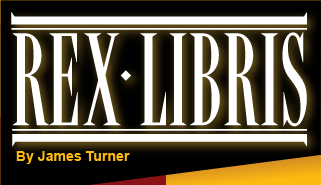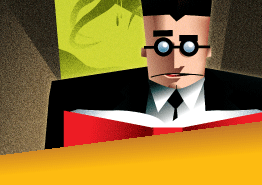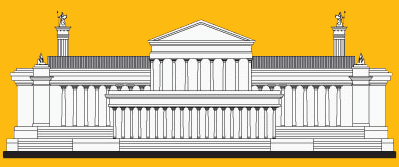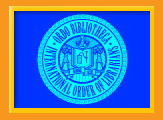|
|
|
 |
 |
 |
|
|
Power = Access to Knowledgeby Greg Hill, Director FNSB Public Libraries Librarians been librarying - acquiring, organizing, storing, and retrieving information - even before the first word was ever written. Proto-writing was based upon tiny clay and stone tokens shaped to look like cows, sheaves of grain, and other goods. These tokens helped farmers, merchants, and kings control their resources, and when this involved a bunch of tokens, they were placed inside a clay envelope. Can't see through clay, so token-shaped marks were made on the envelopes to connote their contents, and these marks evolved into more advanced written symbols and alphabets being used on wet hunks of clay. Your average Mesopotamian shop-keeper could handle his own token-based correspondence, but overlords controlling lots of resources needed a helper to keep track of his growing heap of clay tablets. Even the ancientest royal libraries soon contained astronomical, legal, and religious documents, as well as all the agricultural and economic ones, and right away the library profession sprang into being.  "Scribe" was the proto-librarian's title. He was skilled in the writing and remembering, and, best of all, he could get his hands on information. Even back then access to knowledge equaled power, and ancient libraries were always located in power centers: temples or palaces. 99% of the scribal-librarians' compatriots, including most of the royalty, depended entirely on their librarians to record their words and understand the written words of others. Except for the fact that even commoners can get their hands on info, today's librarians perform the exact same functions as their ancient predecessors; it's just electronics, magnetic, films, and paper we acquire, organize and share instead of clay tablets. And the exponential growth of written and digital information means the future of librarianism is bright indeed! Library Historyby Kate Low, author of 'Casanova Was A Librarian'
The Finer and Baser Passions of Mel Duiby Greg Hill, Director FNSB Public Libraries Melville Dewey organized, streamlined and molded the modern librarian profession more than anyone else, but where on the saints and sinners spectrum did he wind up in the final analysis? Librarians are often perceived by average Joes as being intelligent and wise, but also as weak and mild and even sexless. "Au contraire," say those who've frolicked at a library conference, for they know that, like Dewey, many librarians have exciting, lusty, yea even daring facets to their characters. No less legendary lovers than Casanova, Elvis, and J. Edgar Hoover (oh, yes: he loved) all labored as librarians at some point, and, like each of them, Mr. Dewey had his dark, seamy side. Fascinated from infancy with mathematical schemes, Dewey was a prodigy of efficiency, beginning as a schoolboy when he helped rescue books from his burning school's library. His resulting smoke inhalation developed into a nasty cough, and his doctors gave him only a few months to live, so he became consumed with optimizing every moment. Though he lived to see eighty, Dewey never lost this overriding, manic passion for efficiency. Dewey saw time a-wasting everywhere, including the Amherst College library where he was a dynamo student worker of such insight, determination and diligence, that he was hired full-time upon his graduation. A couple years later, in 1876, Dewey left Amherst for Boston, where he established a company, "The Library Bureau," which, according to its ads, specialized in "furnishing libraries with equipment and supplies of unvarying correctness and reliability." It was Library Bureau that introduced vertical filing cabinets, among many other innovations. 1876 also saw Dewey co-found the American Library Association, and co-found and become managing editor of the "American Library Journal." That same remarkable year he also unveiled his famous Dewey Decimal System of Classification. The great pre-Dewey libraries in London, Paris and New York were highly idiosyncratic in their approaches to organizing their collections, often designing their schemes more for the librarians' convenience, or for secrecy, than for potential readers. It's easy to lose a book among a few thousand others, and some libraries' books were intentionally secreted in labyrinthine cataloging schemes to stymie unauthorized readers, as portrayed in Umberto Eco's fine novel, "The Name of the Rose." Complicated shelving systems carried the added bonus of enhanced job security for the librarians. Some libraries followed organizational schemes like the "fixed location" method of the British National Library, where books are assigned to certain spaces on certain shelves according to their size and the date they were acquired, resulting in less wasted space between shelves since all the books one a particular shelf are the same height. Dewey's idea was to gather books according to their main subjects, instead of their physical dimensions, using a decimal-based numbering system for finer distinctions within each subject. He lumped all subjects into ten main classes, or super-subjects, such as "history," "literature," or "science." These were further divided into sub-categories. So history books, for example, are all in the 900s, with U.S. history being 970s, Alaskan history is 979.8, and so on. Dewey established the first library school, placing a heavy emphasis on attracting female students, especially young, lithesome, and pliant female students. In a less carnal vein, he founded the Metric Bureau and the Spelling Reform Association. He felt so strongly about making English spelling more logical that he formally shortened his name from Melville Louis Kossuth Dewey to plain Melvil Dewey, and wanted to take it down to Dui. Saint or sinner? How about both? The American National Biography says, "Dewey left a substantial legacy, for good and for ill." He lost his job as New York State Librarian because of his blatant racism against Jews, ethnic minorities and consumptives. He was charged with sexual harassment in a time when such acts had to be awfully blatant to be recognized, and he also played fast and loose with the funds of the various organizations he helped establish. As Dewey put it long before his fall, "The eternal conflict of good and the best with bad and the worst is on."  |
|

